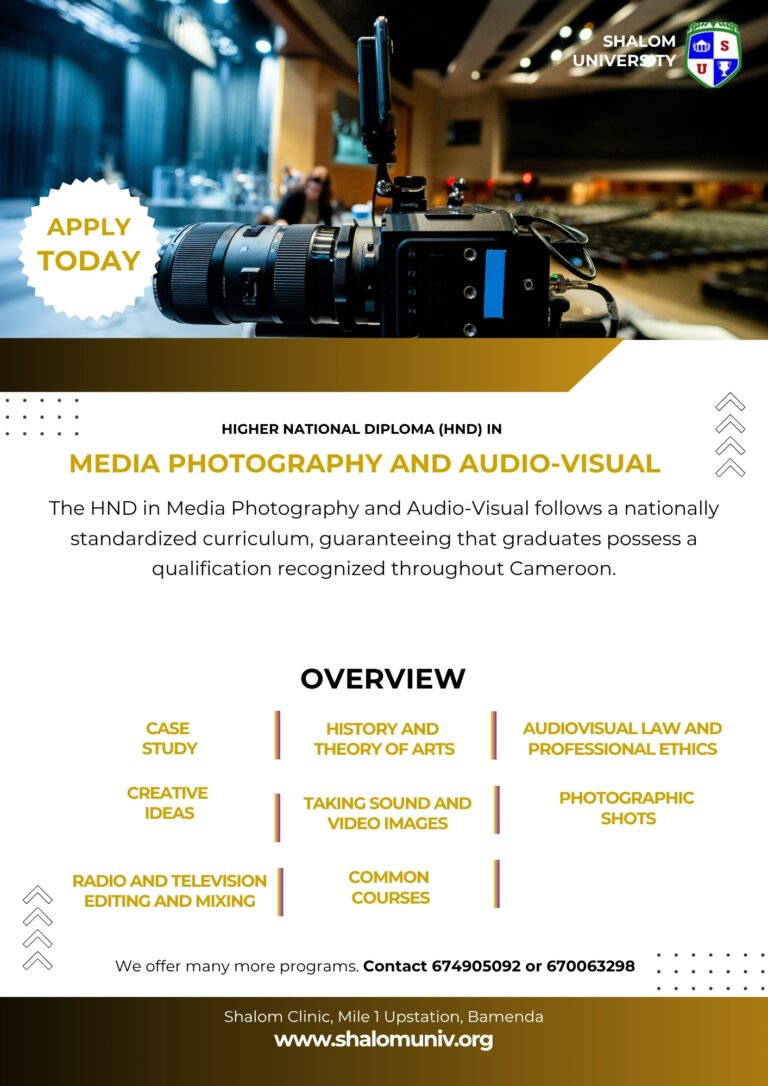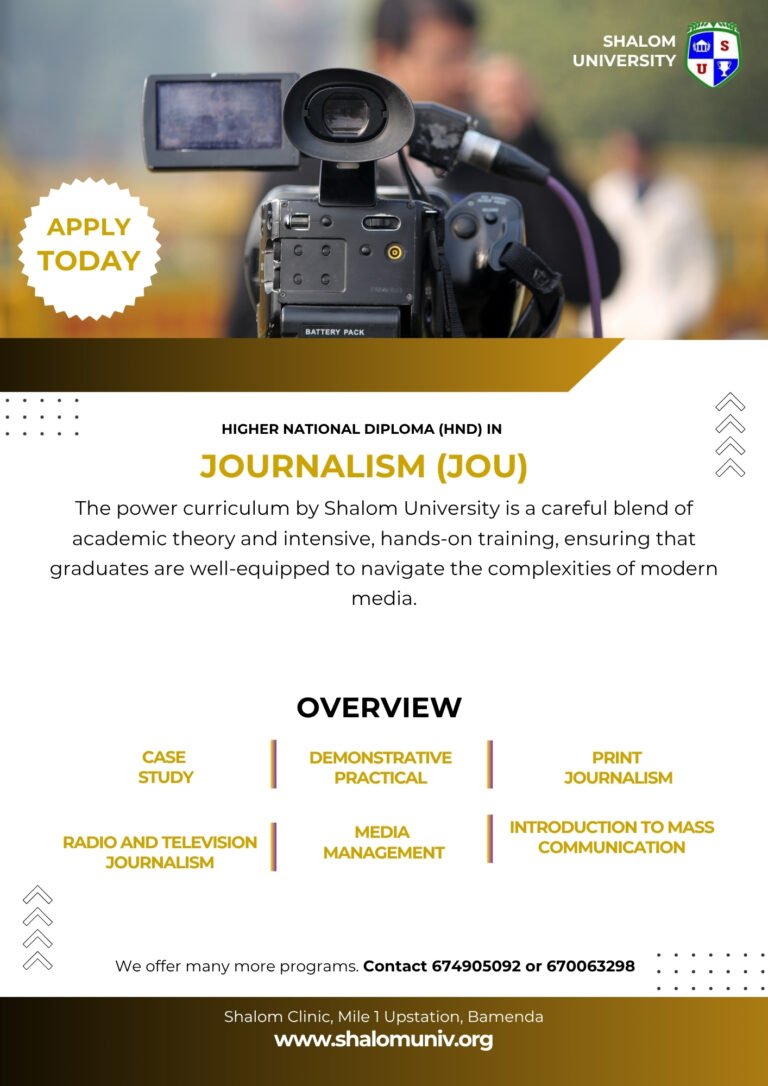In Cameroon’s increasingly competitive business and organizational landscape, effective communication is a strategic imperative, not just a support function. From building brand reputation and engaging employees to navigating crises and fostering positive public relations, skilled corporate communication professionals are essential for organizational success. The HND in Corporate Communication (COC) at Shalom University in Bamenda is designed to train these essential professionals. This program provides aspiring communicators with the blend of strategic thinking, practical skills, and ethical grounding needed to excel in Cameroon’s dynamic corporate environment.
The curriculum at Shalom University is tailored to the Cameroonian context, blending foundational communication principles with an understanding of contemporary issues, media dynamics, and entrepreneurial skills. Graduates are prepared not only to manage internal and external communication but also to contribute to overall business strategy and brand management, making them invaluable assets to corporations, government agencies, and non-profit organizations.
The COC Curriculum at Shalom University
The HND in Corporate Communication program at Shalom University is structured around a set of core papers that provide a comprehensive and practical education in the field.
Paper: Case Study
The Case Study paper is a vital component that integrates all the theoretical knowledge and practical skills gained throughout the program. It challenges students to analyze complex corporate communication scenarios, from managing a product recall to developing a new brand identity. This is particularly relevant for corporate communicators in Cameroon, who must navigate diverse cultural norms, media landscapes, and business challenges.
The course trains students to:
- Analyze real-world communication challenges: Based on a given case, students evaluate the communication strategies, reputational risks, or public relations issues faced by an organization in Cameroon.
- Identify critical issues and underlying causes: They pinpoint specific problems related to internal communication, media relations, or crisis management and explore the underlying factors.
- Propose evidence-based solutions: Students formulate practical recommendations based on corporate communication principles, media relations strategies, and ethical considerations. For example, a case study might involve a company facing a reputational crisis in Cameroon and require a proposal for a strategic communication plan to restore public trust.
- Defend their decisions: During formal presentations, students must justify their analysis and proposed solutions, demonstrating their critical thinking and communication skills, which are essential for effective corporate communication and stakeholder management.
Paper: Practices in Corporate Communication
This paper focuses on the hands-on, practical application of corporate communication functions. It provides students with the essential skills and tools needed to execute day-to-day communication duties effectively, ensuring they are ready for immediate employment.
Key topics include:
- Internal Communication: Strategies for communicating effectively with employees, including newsletters, intranet, and internal events.
- External Communication: The practice of communicating with external stakeholders, including the media, customers, investors, and the public.
- Public Relations: Building and maintaining positive relationships with the media and the public to enhance brand reputation.
- Event Management: Planning and executing corporate events, from press conferences to product launches.
- Writing for Corporate Communication: Writing press releases, corporate reports, speeches, and other corporate communication materials.
Paper: Contemporary Issues and Communication
In today’s rapidly changing world, corporate communicators must be aware of and responsive to a wide range of contemporary issues, from social and environmental concerns to technological advancements. This paper provides students with the knowledge to navigate these issues effectively.
The curriculum covers:
- Corporate Social Responsibility (CSR): Understanding the principles and practice of CSR and how organizations can communicate their CSR initiatives effectively within the Cameroonian context.
- Digital Communication and Social Media: The use of digital platforms and social media for corporate communication, including social media marketing, content creation, and online reputation management.
- Crisis Communication: The principles and practice of managing communication during a crisis, including developing crisis communication plans and responding effectively to negative publicity.
- Diversity and Inclusion: Communicating effectively in a diverse workplace and promoting diversity and inclusion initiatives.
Paper: Business and Corporate Communication
This paper provides students with a strategic understanding of how communication functions within a business context. It bridges the gap between communication theory and business practice, ensuring students can contribute strategically to organizational goals.
Key topics include:
- Strategic Communication Planning: Developing communication plans that are aligned with organizational objectives and contribute to business strategy.
- Brand Management: The role of corporate communication in building and managing a strong brand identity and reputation.
- Stakeholder Engagement: Identifying and engaging with key stakeholders to build trust and support for organizational initiatives.
- Integrated Marketing Communication (IMC): Understanding how corporate communication fits into a broader IMC strategy, including advertising, sales promotion, and public relations.
Paper: Introduction to Mass Communication (common COC and JOU)
This common paper provides students with a broad theoretical understanding of mass communication and its role in society. It helps students contextualize their corporate communication practice within the larger framework of media’s social, cultural, and political impacts.
The curriculum covers:
- Theories of Mass Communication: Key theories of mass communication and their application in understanding media effects.
- Role of Media in Society: The functions of media in a democratic society, including its role as a watchdog and its influence on public opinion.
- Media and Culture: The relationship between media and culture and how media shapes cultural values and identities in Cameroon.
- History of Media in Cameroon: An overview of the history of media in Cameroon, from its early days to the present, and the key milestones and challenges.
Paper: Entrepreneurial Studies
This paper equips students with the foundational skills needed to identify business opportunities, develop business plans, and manage their own enterprises. In Cameroon, where entrepreneurship is a key driver of economic growth, these skills are invaluable for corporate communicators who may one day launch their own communication agencies or consultancies.
The curriculum covers:
- Business Planning: The process of developing a business plan, including market analysis, financial projections, and operational plans.
- Innovation and Creativity: Techniques for fostering innovation and developing creative business ideas.
- Marketing and Sales: Strategies for marketing products and services and building a customer base.
- Financial Management: Principles of managing business finances, including budgeting, cash flow, and financial reporting.
Paper: Media and Strategy Relations
This paper focuses on the specialized area of managing relationships with the media strategically. It provides students with the skills to effectively engage with journalists, manage media coverage, and leverage media platforms to advance organizational goals.
Key areas of focus include:
- Media Relations: Building and maintaining positive relationships with journalists, editors, and other media professionals.
- Press Conferences and Media Briefings: Planning and executing press conferences and media briefings effectively.
- Media Monitoring and Analysis: Using media monitoring tools to track media coverage and analyze its impact on brand reputation.
- Content Creation for Media: Developing and pitching story ideas, press releases, and other content for media placement.
Building Bridges of Communication
Graduates of the HND in Corporate Communication from Shalom University are well-prepared to enter the workforce in various roles across Cameroon’s corporate, public, and non-profit sectors. They can serve as Communication Officers, Public Relations Specialists, Marketing Coordinators, or Social Media Managers in a wide range of organizations. Their proficiency in corporate communication practices, media relations, crisis management, and entrepreneurial skills, coupled with a deep understanding of the Cameroonian context, makes them invaluable assets to any organization striving for strategic communication and brand excellence. The Case Study paper ensures that they are not just theoretically sound but also adept at applying their knowledge to solve real-world communication challenges. By providing a practical and contextually relevant education, Shalom University plays a significant role in nurturing the communication expertise crucial for fostering trust, building reputation, and driving growth in Cameroon.



